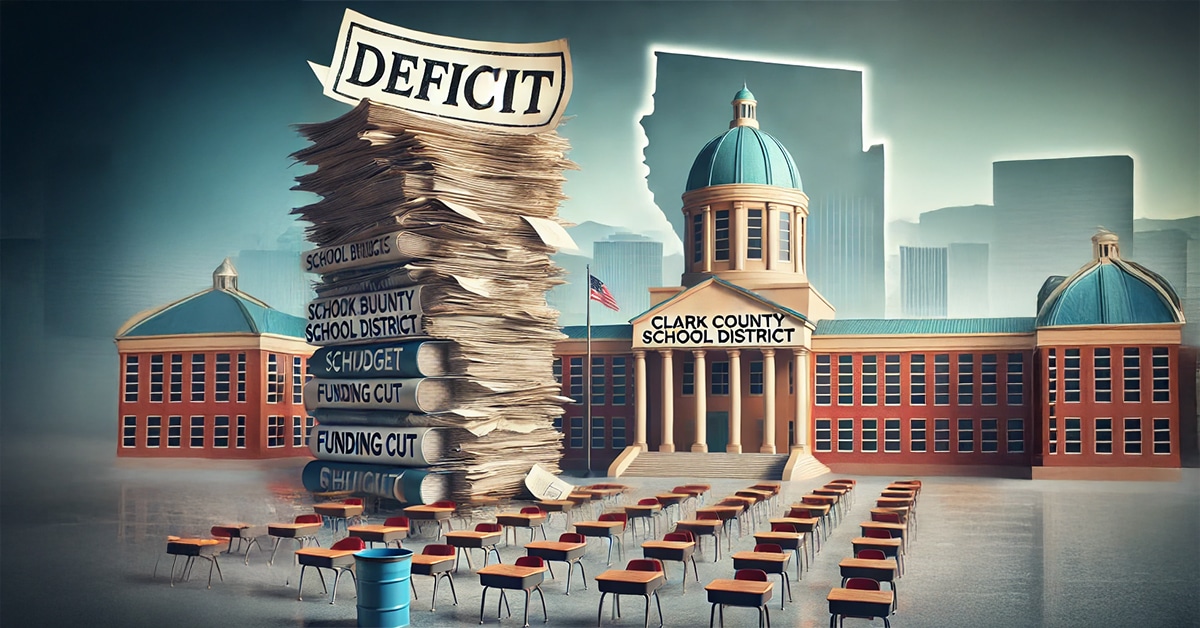The Crisis: Overspending and Mismanagement in Nevada’s Largest School District
Clark County School District (CCSD) continues to face a severe budget crisis, despite receiving historic levels of funding in the 2023 legislative session. Schools throughout the district are struggling to meet their budget projections, with deficits ranging from $750,000 to over $1 million per elementary school. These financial shortfalls have led to cuts in teaching positions, programs, and essential student services, raising serious concerns about the district’s ability to manage its funding effectively.
One of the primary issues contributing to CCSD’s financial instability is mismanagement and inefficient allocation of resources. Previous budgeting errors, including incorrect calculations for educator salaries and misapplied funding formulas, have resulted in costly mid-year corrections. This level of fiscal irresponsibility forces schools to make last-minute staff reductions and program cuts, disrupting student learning and eroding public trust in the district’s ability to function effectively.
Recent Funding Increases and Where the Money Went
Nevada’s 2023 legislative session provided a historic $2.6 billion increase in education funding, bringing total K-12 spending to nearly $12 billion over the biennium. This funding boost resulted in an increase of over $2,500 in per-pupil spending by fiscal year 2025 and significant allocations to at-risk student programs. The Clark County School District, being the largest in the state, received a substantial portion of this funding.
Despite this record-breaking investment, CCSD continues to struggle with financial shortfalls, prompting questions about whether these funds are being allocated effectively. The district’s total budget for the 2023-2024 school year was $3.4 billion, yet it still faces financial gaps due to cybersecurity expenses, unexpected enrollment shifts, and salary increases. These factors highlight poor financial planning and a lack of accountability within CCSD.
How CCSD Wastes Taxpayer Dollars
- Excessive Administrative Overhead
- CCSD has a top-heavy bureaucratic structure, diverting millions away from classrooms and student support services.
- Large salaries for administrative staff reduce funding for teachers and student programs.
- Inefficient Budgeting Practices
- Consistently inaccurate budget projections force last-minute cuts and funding reallocations.
- Schools are left scrambling to adjust mid-year, disrupting educational continuity.
- Failure to Prioritize Classroom Funding
- Despite budget increases, essential classroom programs continue to be cut.
- Gifted programs and specialized learning initiatives have been reduced due to misallocation of funds.
- Costly Legal Battles and Compliance Issues
- Lawsuits and labor disputes have cost CCSD millions in legal fees.
- State-imposed corrective actions add another layer of oversight, increasing administrative costs.
Recommended Reforms for Lawmakers
To address CCSD’s budget crisis, Nevada lawmakers must take decisive action in the 2025 legislative session to enforce fiscal responsibility and efficiency. Here are key policy recommendations:
- Implement Performance-Based Budgeting (PBB)
- School funding should be linked to student outcomes and measurable performance metrics, ensuring that ineffective programs do not receive continued funding.
- Reduce Administrative Costs
- CCSD should streamline its bureaucratic structure to prioritize classroom spending over administrative salaries.
- Conduct a third-party audit to identify redundant positions and inefficiencies.
- Expand School Choice and Charter School Funding
- Providing parents with more education options forces greater competition and efficiency in CCSD.
- Redirect funding toward charter schools and education savings accounts (ESAs) to allow tax dollars to follow students.
- Outsource Non-Essential Services
- CCSD should privatize school transportation, maintenance, and food services to lower costs and improve efficiency.
- Many school districts nationwide have saved millions annually through outsourcing.
- Strengthen Financial Oversight and Accountability
- Require independent financial audits of CCSD’s spending to ensure transparency.
- Tie future state funding increases to evidence of responsible financial management.
Conclusion: A Call for Fiscal Responsibility
CCSD’s budget crisis is a result of mismanagement, bloated bureaucracy, and inefficient allocation of resources. Despite receiving record-breaking levels of state funding, the district continues to waste taxpayer dollars while forcing cuts that harm students and teachers. Nevada lawmakers must act in the 2025 legislative session to implement real fiscal reforms that prioritize students, enforce accountability, and stop the cycle of reckless spending.


0 Comments